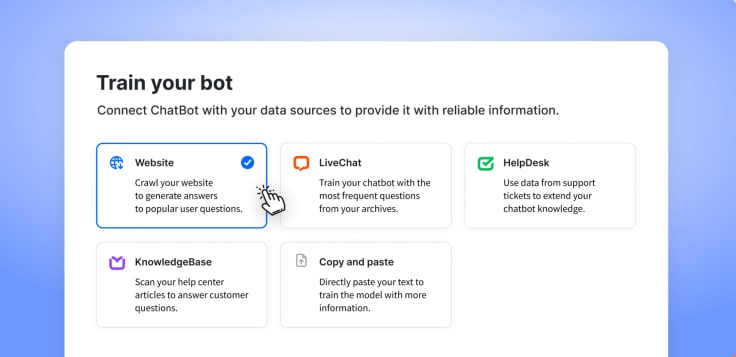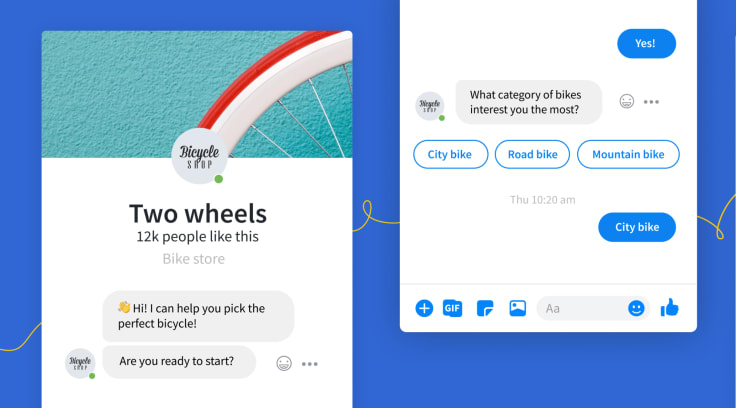Showing top 0 results 0 results found
Showing top 0 results 0 results found

2023 witnessed significant and swift growth in the development of chatbots. The increasing importance of AI in the online sales industry, as well as in the online world generally, had a massive influence on future trends and the direction taken by virtual assistants. Companies have been striving to outdo each other by incorporating the latest intricate, enhanced, and characteristic features into their chatbots.
We can forget about strange, robotic creations that frustrate us. The existing bots are geared towards personalization and improving the customer experience.
And if you think this is just the beginning, you're right. As chatbots continue to advance in their communication skills with customers, there have been more positive interactions. According to a recent study, 80% of customers had a pleasant experience interacting with bots.
So what lies ahead? What is the future of chatbots? Let's find out by reviewing the top chatbot industry trends for 2024.
🤖 Would you like to grow your business with AI?
Chatbots in numbers
Verloop's research shows that the global business community expects to save up to $8 billion through digital assistants. This highlights the significant impact of these assistants on the business world. As a result, the chatbot market is predicted to reach a value of $102.26 billion.
This phenomenon is not limited to specific countries or regions. The US, India, Germany, the UK, and Brazil are leading the way in this transformative wave, with approximately 1.5 billion people using these virtual assistants globally.
According to Gartner, a technology research firm, chatbots could become the primary channel for customer service in one-fourth of businesses by 2027. This prediction is supported by the recent surge in chatbot adoption, which has seen a 67% increase.
Major players in the industry, such as Oracle, also endorse this trend, reporting that 80% of companies have plans to integrate chatbots into their customer support strategies.
What are the chatbot trends for the next year?
Now that we have analyzed the data, let's make some chatbot predictions for this year. How much do you expect things to change?
Generation Z and chatbot trends
Although the technologically-educated Generation Z (Gen Z) is on board with chatbots, closer inspection reveals a more moderate enthusiasm.
Undoubtedly, Generation Z uses online platforms daily, spending a lot of time on social media and messaging apps. A report conducted by LiveChat shows that Gen Z communicates faster, shorter, and more efficiently using just social media.
Although AI-powered instant messaging is convenient, only 44% of Generation Z respondents believe that chatbots will replace traditional call centers. This indicates their awareness that different communication methods are needed for different situations.
On the other hand, around 20% of Gen Z shoppers prefer to initiate customer service interactions via chatbots rather than engaging human agents, a significant contrast to the mere 4% preference observed among the baby boomer generation. Moreover, 56% of Gen Z think more companies should try chatbot technology.
As we delve deeper into the expectations of Gen Z, we can see that they have high standards for brands. They expect brands to align with their values, offer personalized incentives, and engage with them in real time.
Chatbots will be more human-like
Chatbot development will rely on the integration of three crucial components: natural language processing (NLP), artificial intelligence (AI), and machine learning (ML).
The combination of NLP and ML has enabled chatbots to understand conversations more intelligently, comprehend the nuances of query intention, and improve their accuracy in executing commands, even in technical situations.
Despite the challenges, companies are increasingly focusing on developing chatbots that can surpass their current limitations, aiming to provide seamless interactions that differ from those with human agents.
For instance, the latest version of ChatBot, powered by advanced AI technology, can extract information from your website, knowledge base, or internal wiki and, based on this information, create conversation scenarios with your customers.

This approach to chatbot development aims to unlock benefits, including personalized customer experiences, making conversations with chatbots more like human interaction.
Artificial intelligence chatbots will be everywhere
Artificial intelligence is expected to dominate this year, and it's no surprise why.
Chatbots Magazine says businesses can decrease customer service expenses by up to 30% by incorporating conversational chatbots into their service environment.
AI is expected to transform multi-channel contact centers in the coming years through various revolutionary trends.
- Business automation: chatbots contribute to business automation by handling simple queries quickly, providing quick responses, and improving overall customer service.
- Predicting customer behavior: predictive analytics facilitated by AI helps contact centers indicate customer intent, enabling them to adjust strategies, product launches, and agent workflows accordingly.
- Improved experience: chatbots, through data collection, understand the context of interactions, leading to faster resolution and enhanced customer experience.
Voice bots are becoming mainstream
The coming year will see the explosive growth of voice technology, which will transform the user experience through interactive and personalized interactions. More than 50 percent of searches are expected to be made by voice.
Key reasons for the popularity of voice bots include:
- Engaging automation: bots bring dynamics to automated communication, increasing user engagement.
- Reliable data insights: companies use bots to provide reliable real-time data and information.
- Personalization capabilities: bots unlock personalization opportunities, meeting diverse customer requirements.
The customer experience (CX) will drive virtual assistant adoption
As social media and messaging apps gain popularity, AI chatbots are revolutionizing customer-business interactions.
It is crucial to keep up to date with the latest trends in the chatbot industry to establish and maintain strong customer relationships. Improving customer satisfaction enhances their interaction with a business and has significant financial benefits.
This is why ensuring that your virtual assistant is versatile and allows for much integration is so important. ChatBot reaches your users wherever you want, even on their social media channels, thanks to its integration with Facebook Messenger.

Messaging platforms as a growth driver for chatbot
Messaging platforms are transforming business interactions through conversational commerce, focusing on strengthening the brand, improving customer service, and promoting online shopping through chatbots. The deployment of messaging apps drives this trend.
Communication platforms with chatbot features serve various business functions:
- Marketing engagement: 47% of users are open to purchasing items via a bot, trusting chatbots as practical tools for business interactions.
- Customer service: the AI chatbot effectively handles simple queries, increasing customer support when the human team is busy. Check ChatBot for customer support.
- Sales and lead generation: chatbots improve sales by qualifying potential customers on websites and social channels.
🤖 Would you like to grow your business with AI?
Chatbot challenges and opportunities in 2024
The advancement in chatbot architecture and design is leading to a future where interactive AI will be the norm for customer service. Many major tech companies are already working on developing advanced chatbots and machine learning technology, which shows their dedication to improving user experiences.
Even more exciting is that you can now create a chatbot without coding knowledge. Try ChatBot and experience the power of bots firsthand. Sign up for a free 14-day trial.
During this trial period, you can explore and test the key features that make ChatBot the ideal solution for meeting your customer service goals. Take advantage of this opportunity to revolutionize customer interactions and enhance business efficiency.



